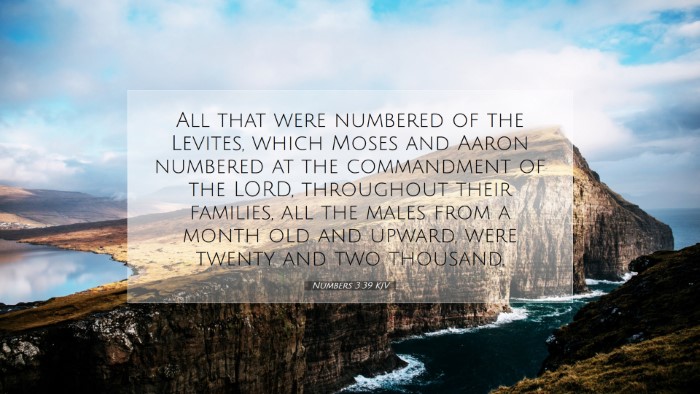Commentary on Numbers 3:39
Verse Reference: Numbers 3:39 - "All that were numbered of the Levites, which Moses and Aaron numbered at the commandment of the LORD, throughout their families, all the males from a month old and upward, were twenty and two thousand."
Introduction
This passage from the book of Numbers outlines a significant moment in the history of Israel, centering on the Levites and their designated role as priests and caretakers of the tabernacle. It is a moment that encapsulates the importance of order, responsibility, and divine calling within the Israelite community.
The Context of Numbers 3
The book of Numbers primarily documents the Israelites' journey in the wilderness after their exodus from Egypt. Chapter 3 focuses on the Levites, a tribe designated for special service to God. The numbering of the Levites signifies not only their population but their specific divine calling and function.
Divine Command and Leadership
In verse 39, we observe the execution of God's command through Moses and Aaron. Both leaders are integral in this context, illustrating the divinely instituted leadership structure that God established. Matthew Henry notes that God's directives through these leaders reflect divine authority and the sacred establishment of the priesthood. Such leadership is crucial for maintaining order within the community.
Counting the Levites
The reference to "twenty and two thousand" Levites, all males from a month old and upward, emphasizes the significance of participation from the earliest stages of life in service to God. Albert Barnes elaborates that this counting indicates not just a census but a recognition of their unique position among the tribes of Israel. This also suggests a principle of early dedication to God’s purposes, indicative of the Levite's lifelong service to the Lord.
Theological Implications
The counting of the Levites speaks volumes about God’s design for order in worship and service. Adam Clarke asserts that the Levites represent a foreshadowing of the New Testament priesthood, calling believers to a commitment to holiness and worship. The significance of counting the males specifically demonstrates the importance of accountability and responsibility within the spiritual community.
Covenantal Relationship
This passage reaffirms God's covenant with the Israelites, particularly concerning the tribe of Levi. The Levites were chosen out of all the tribes of Israel to bear the responsibilities of the tabernacle. Matthew Henry comments on the gravity of being set apart for something sacred. The Levites’ lives were devoted entirely to the service of God, emphasizing the need for commitment among those in leadership and ministry.
Symbolism and Typology
The number of Levites can also be interpreted symbolically. The number "twenty-two thousand" can be seen to represent completeness and fullness within the priestly function. Albert Barnes notes that in Biblical numerology, the number often reflects a significant spiritual reality. This fullness points to the sufficiency of God’s provision among His people, particularly in the context of worship.
Applications for Today
For pastors, students, and theologians, the significance of Numbers 3:39 provides valuable lessons for contemporary faith communities:
- Understanding Divine Order: Just as the Levites had specific roles and responsibilities, contemporary church leadership models should strive for clarity in roles, upholding the principles of order and purpose in ministry.
- Early Commitment: The practice of dedicating lives to service from an early age can inspire churches to invest in the spiritual growth of young people, emphasizing the value of lifelong commitment to God.
- Recognition of Divine Calling: Each believer is called to a specific role within the body of Christ. Recognizing and affirming God's call is essential for fostering a vibrant church community.
- Accountability in Service: Ensuring accountability among church leaders and members draws upon the example of God's order among the Levites, reflecting the need for transparency and responsibility in ministry.
Conclusion
In summary, Numbers 3:39 serves as a vital reminder of God's specific calling and the importance of order within the community of faith. Through the Levites' example, modern readers are called to consider their roles in God's plan and the seriousness of serving Him faithfully. Just as the Levites were counted and set apart, so too are Christians today called to be counted among those committed to God’s service, fulfilling their unique roles in the body of Christ.


